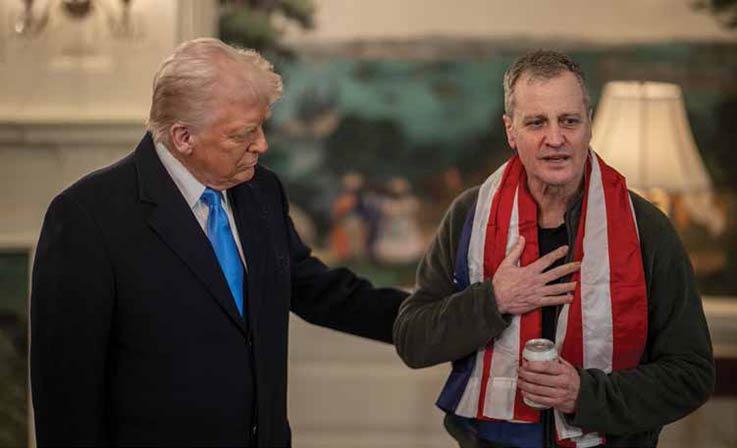By Mary Ann Slater
After more than three years in confinement, Marc Fogel ’84 was released from a Russian labor camp in February.

President Donald Trump with Marc Fogel, the day of his release, at the White House.
(Daniel Torok)
A Butler native now living in Pittsburgh, Fogel had taught English all over the world and had spent nine years working with students in Russia. In August 2021, at the start of his last year teaching there, Russian officials took him into custody at a Moscow airport for possessing a small amount of medical marijuana. Ten months later, he was sentenced to 14 years in a labor camp.
During his imprisonment, family members and friends, including many IUP alumni, petitioned US government officials to help with Fogel’s release. They repeatedly asked President Joe Biden and other high-ranking government officials to designate Fogel as “wrongfully detained,” a status that can expedite a prisoner’s release.
That designation was announced late last December. Just over a month later, on February 11, Fogel flew as a free man into Maryland’s Joint Base Andrews and subsequently met with President Donald Trump at the White House.
After evaluation at Brooke Army Medical Center in San Antonio, he was able to return home to Pittsburgh. Vicki Iseman ’90 and Tommy Hartman ’81, two of the alumni who championed his cause, said Fogel has sought privacy as he slowly reintegrates into life at home.
IUP President Michael Driscoll joined the advocacy efforts after an alumnus told him about failed attempts to secure Fogel’s release. Driscoll went to Washington to talk with members of Congress. He also knew galvanizing IUP alumni into action was important.
“A hallmark of IUP is the fact that alumni stay connected and help each other across generations, not just within a particular class,” Driscoll said.
He asked Iseman, a lobbyist who has helped IUP in the past, to publicize Fogel’s plight. Iseman, who lives in West Palm Beach, Florida, sought to introduce the world to Marc Fogel, the person—a longtime international teacher and family man from western Pennsylvania who suffered chronic back pain, which is why he had medical marijuana.
Friends, family members, fellow alumni, and politicians in Pennsylvania and DC were looking for ways to support Fogel, Iseman said.
“You had all these people that were trying to help. I wanted to make sure that was congealing in a way that would make a difference.”
Collaborating with the Fogel family, she and her team put together a website, freemarcfogel.net, to share his story. Still accessible, the website includes family photos, newspaper stories about his detention, a documentary by his former students, and a statement from Fogel himself. Dated March 4, the statement previewed his guest appearance at the Capitol that evening when President Trump addressed a joint session of Congress.
Fogel expressed his appreciation to members of Congress and the many others who supported him. “I am so grateful,” the statement read. “Words cannot adequately express the magnitude of my emotions. I will be back to meet with many to thank you personally.”
While he was detained, supporters also established a Freedom for Marc Fogel page on Facebook. Hartman, a friend of Fogel’s from Westlake, Ohio, frequently posted on the page, which ultimately had 2,000 members. Upon Fogel’s return, organizers closed the page to respect his privacy.
Hartman also spearheaded a letter-writing campaign seeking assistance for Fogel’s release. He estimated 10,000 letters from 350 supporters were sent to officials of both political parties.
Hartman has seen Fogel since his return, including with IUP friends Bill Spencer and Bob Lyon, both of the Class of ’83. He said Fogel’s overall well-being is improving: “He is starting to reach out to his friends and have little get-togethers.”